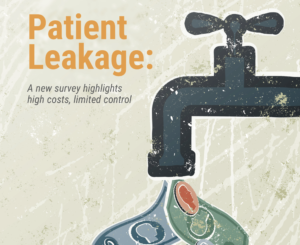Payments
You read that right: About a quarter of all US hospitals — 26% — do not have an effective healthcare revenue cycle management solution in place, according to a new Black Book survey. According to RevCycle Intelligence, Black Book surveyed over 4,640 individuals from 522 hospitals and healthcare delivery networks regarding their use of 165 revenue…
Read MoreRevCycle Intelligence reports on a new survey that healthcare organizations are losing revenue because they are failing to properly manage referrals and patient leakage. Some of the report’s findings: There’s a gap between priority and action. Some 87% of healthcare executives say patient leakage is a high priority, but 23% don’t track leakage and 20% don’t…
Read MoreIn today’s “retail medical market” with heightened RCM patient focus, improving a patient’s financial experience is a key to healthcare revenue cycle management success, according to the Senior Regional Director of Revenue Cycle at Ascension Healthcare. RevCycleIntelligence.com reports that the ability to implement self-service technology and give accurate price estimates is key to improving the patient experience…
Read MoreResults of a recent a recent JAMA study as reported in EHR Intelligence reveal that a disturbing amount of hospitals fail to comply with federal and state regulations for patient EHR and paper health records requests. This is especially damaging in today’s healthcare retail climate, where patients understandably want to know what their costs are. Researchers made…
Read MoreA study from Eliciting Insights shows that, while adoption of revenue cycle technology is brisk, some medical facilities are hesitant to adopt automated remittance posting in spite of its proven ability to solidify the bottom line in challenging times. Based on survey responses from 179 hospital revenue cycle executives, here are some takeaways as reported on Becker’s Hospital CFO…
Read MoreWhile the consumer “civilian” world has pretty much learned and accepted the “don’t take checks from strangers” rule, the corporate world is both slow to adopt that guideline — and often unable to. This is due to the fact that suppliers like the “float” advantage they enjoy with check payments. (“We paid you on Tuesday…
Read MoreAs this Hospital CFO Report post illustrates, RCM Management job openings are available all over the country. But what are the new challenges that a Revenue Cycle Management Specialist face in the evolving world of medical billing? One emerging area of focus is a firm grasp of The Medicare National Correct Coding Initiative (NCCI; also known…
Read MoreAn article produced by Intel outlines the ways Artificial Intelligence — AI — solutions can be deployed while using an organization’s existing technological infrastructure. The result is maximum gain with minimum expense and downtime. Watch this video for an interesting perspective on AI utilization. Intel’s article outlines three key areas where enterprises are experimenting with AI…
Read MoreIn an environment where value-based reimbursement performance presents challenges to even the most “metropolitan” of hospitals and healthcare facilities, rural hospitals find themselves facing challenges heightened by their specific set of circumstances. As RevCycleIntelligence reports: Despite serving as a critical healthcare safety net for millions of patients, many rural hospitals are constantly on the brink…
Read MoreThere are many reasons for the resilience of checks (including the small- and mid-sized businesses that rely on the paper check’s “float” for accounting purposes), but one important factor has been fear of fraud and security risks in newer digital transactions. Digital transactions are indeed growing at a rapid rate — particularly among millennials, many…
Read More








